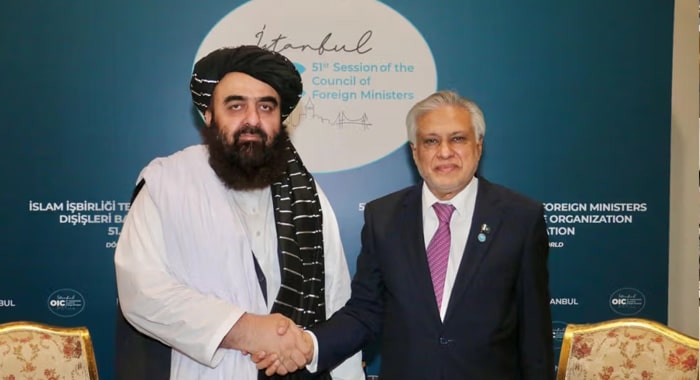In a significant diplomatic development, Pakistan’s Deputy Prime Minister and Foreign Minister Mohammad Ishaq Dar met with the Taliban’s Acting Foreign Minister Amir Khan Muttaqi on the sidelines of the 51st session of the Organisation of Islamic Cooperation (OIC) Council of Foreign Ministers in Istanbul. The two counterparts discussed a wide-ranging agenda focused on strengthening bilateral ties, advancing regional connectivity, and enhancing multilateral engagement.
According to a statement released by the Taliban’s Ministry of Foreign Affairs, the talks centred on trade and transit facilitation, cross-border infrastructure, and preparations for the upcoming trilateral summit involving China, Pakistan, and the Taliban-led Afghan administration. The meeting is scheduled to take place in Kabul.
Both ministers reaffirmed their shared commitment to fostering practical cooperation, particularly on strategic projects such as the Trans-Afghan Railway — a pivotal initiative aimed at connecting Central Asia with Pakistani seaports through Afghan territory. Foreign Minister Muttaqi expressed confidence that the recent elevation of diplomatic relations between Islamabad and Kabul would lead to more constructive, institutionalised engagement.
Deputy Prime Minister Dar emphasized Afghanistan’s critical geographic and strategic role in regional economic integration. Welcoming Afghanistan’s inclusion in the China-Pakistan Economic Corridor (CPEC), he termed it a “timely and promising step” toward unlocking the region’s transit and trade potential. Dar also noted that joint infrastructure initiatives could pave the way for long-term stability and development across the region.
The meeting built on the momentum of Dar’s April 2025 visit to Kabul, during which both sides agreed to accelerate cooperation in trade, transport, and customs facilitation. Progress made since then has been underpinned by a trilateral dialogue hosted by China in Beijing, where Pakistan announced its decision to upgrade its diplomatic representation in Kabul from chargé d’affaires to a full ambassadorial post — a move widely viewed as a sign of normalising relations.
Despite longstanding tensions over border security and counterterrorism, both sides have shown a renewed willingness to address contentious issues through dialogue. The relationship has previously been strained by cross-border violence, including frequent clashes at Torkham, Spin Boldak, and Dand Wa Patan, and Pakistani airstrikes inside Afghan territory — actions that have drawn sharp condemnation from Kabul.
Islamabad continues to express concern over the presence of Tehreek-e-Taliban Pakistan (TTP) fighters and Baloch insurgents operating from Afghan soil, allegedly with support from hostile foreign intelligence networks. Kabul, in turn, accuses Pakistan of harbouring and facilitating elements of the Islamic State Khorasan Province (ISKP) — a charge Islamabad denies.
Following the latest round of talks, reports in Pakistani media suggest that Taliban officials have assured Islamabad of measures to prevent cross-border attacks carried out by TTP militants. Pakistani intelligence estimates that over 6,000 TTP fighters — including senior commanders are currently based in Afghanistan.
The forthcoming trilateral summit in Kabul is expected to further consolidate regional cooperation, with a focus on joint counterterrorism efforts, integrated infrastructure, and sustainable economic development.





